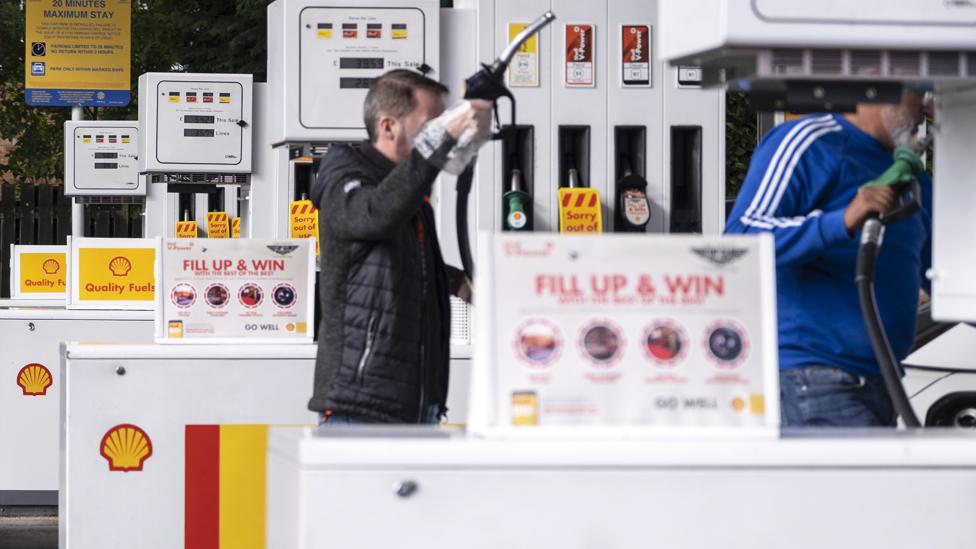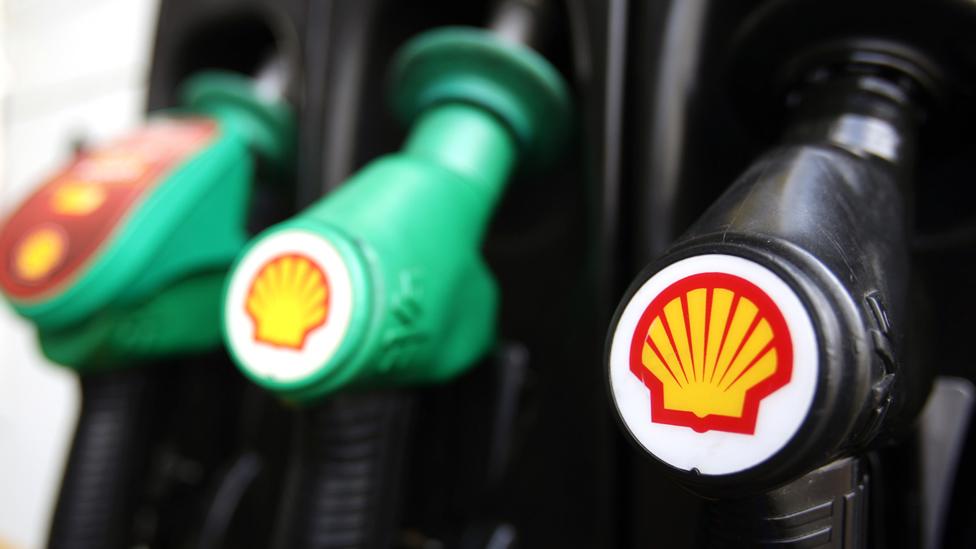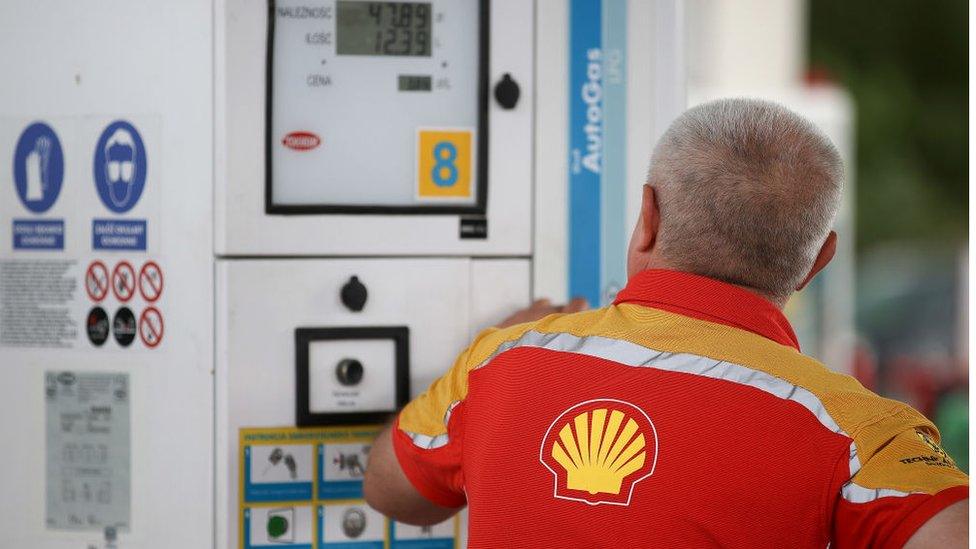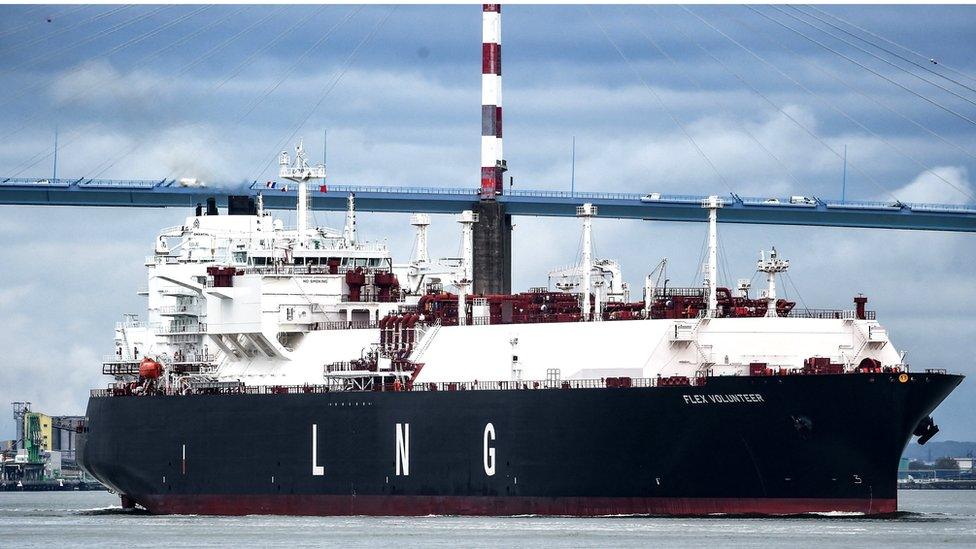Shell pays no UK windfall tax despite profits jump
- Published
- comments

Shell has reported its second highest quarterly profit on record but it has not paid the UK's windfall tax on energy firms.
The energy giant said global profits reached $9.5bn (£8.2bn) between July and September, compared to $4.2bn during the same period last year.
However, Shell said that because it had made large investments in the UK, it meant it had made no profit here.
It also does not expect to start paying windfall taxes until early next year.
The Energy Profits Levy - or windfall tax - on the profits of energy firms was announced by Rishi Sunak in May, when he was chancellor. At the time he said it would raise £5bn in its first year.
Oil and gas prices began to rise after the end of Covid lockdowns but have surged since February after Russia's invasion of Ukraine, resulting in bumper profits for energy companies.
Higher oil and gas prices has also fuelled the rise in energy bills for both households and businesses. The government is limiting gas and electricity bills through the Energy Price Guarantee scheme but instead of lasting for two years as originally planned, it will now end in April.
There have been warnings that typical household gas and electric costs could reach more than £4,300 when support is scaled back. The price of energy has also been a major driver of inflation - the rate at which prices rise - which is currently 10.1%.
'Fair share'
Ed Miliband, Labour's shadow climate change secretary, said the current windfall tax on energy firms was flawed and "would see billions of pounds of taxpayer money go back into the pockets of oil and gas giants through ludicrous tax breaks".
Shell's profits were "further proof" the UK needed a higher windfall tax to make sure energy companies "pay their fair share", he said.
The Liberal Democrats, Green Party and campaigners have also criticised the current policy.
But cabinet minister Nadhim Zahawi defended the windfall tax, telling the BBC's Today programme Shell and other energy giants already pay high taxes.
He added that the existing levy was introduced in a "very smart way" because it incentivised investment.
"We need them to invest in the North Sea assets to grow our production," he said.
A spokesperson at the Treasury said the Energy Profits Levy was expected to raise £17bn this year and next, and came on top of a headline rate of tax for the industry of 40%.
"We also want to see the sector reinvest its profits to support the economy, jobs, and our energy security, which is why the more investment a firm makes into the UK, the less tax they will pay," they added.

A windfall tax is a one-off levy that targets companies who benefit from something they were not responsible for, in this case a sharp rise in oil prices.
The 25% tax is applied only to UK profits which, for most oil and gas companies, is a small part of their operations.
Oil and gas firms operating in the North Sea are taxed differently to other firms. They pay 30% corporation tax on their profits as well as a supplementary 10% rate. On top of that, they pay the windfall tax taking their total tax rate to 65%.
However, firms have been able to reduce the amount of tax they pay by factoring in losses or spending on things like decommissioning North Sea oil platforms. It means that in recent years, the likes of BP and Shell have paid almost no tax in the UK.
The Energy Profits Levy also has a measure that allows energy companies to apply for tax savings worth 91p of every £1 invested in fossil fuel extraction in the UK.
Downing Street said that any changes to the windfall tax would be a matter for Chancellor Jeremy Hunt's autumn statement.
The prime minister's official spokesman said "no options" were off the table given the country's economic circumstances.
Shell said it made investments worth $400m in the UK during its third quarter. The firm's finance chief Sinead Gorman said on Thursday: "We simply are investing more heavily than we have, and therefore we don't have profits which we can be taxed against."
Shell chief executive Ben van Beurden said the company was "working closely" with governments and customers to "address their short and long-term energy needs".
'Obscene'
Mr van Beurden previously said taxes on firms within the oil and gas industry were "inevitable" to help the poorest people. He said energy markets could not behave in a way that "damage a significant part of society".
But Frances O'Grady, general secretary of the TUC union, said Shell's profits were "obscene - especially at a time when millions are struggling with soaring bills".
"The government has run out of excuses," she said. "It must impose a higher windfall tax on oil and gas companies. The likes of Shell are treating families like cash machines."

So far this year, Shell has reported profits of $30bn which is more than double the amount it made over the first nine months of 2021. The company plans to reward its shareholders with a 15% increase in its regular dividend and is on track this year to beat its record annual profit of $31bn in 2008.
Stuart Lamont, an investment manager at RBC Brewin Dolphin, said the higher pay-out from Shell to its shareholders "may well raise a few eyebrows" at a time when UK households are facing surging energy bills.
'Gold mine'
Jonathan Gant, a fossil fuels campaigner at Global Witness, said oil and gas companies were the architects and beneficiaries of a "broken energy system".
He said it was "blindingly obvious" that energy firms were sitting on an "untapped gold mine".
"It's time to stop punishing people for a system they didn't create and take the money this country desperately needs from the immense profits Shell and other energy companies are enjoying."
But Andy Mayer of the Institute of Economic Affairs, a free market think tank, said: "Few companies will invest where politicians are hostile to development before it happens, then punish success after the event."
Nathan Piper, an oil and gas analyst at Investec, said fears of recession in many countries had led to oil prices dropping globally. Gas prices in the UK have also dropped sharply due to a lack of gas storage space and unseasonably mild October weather.
However, Mr Piper told the BBC the drop was "likely to be short-lived ahead of colder winter weather and associated increases in gas demand for heating".
- Published25 October 2022
